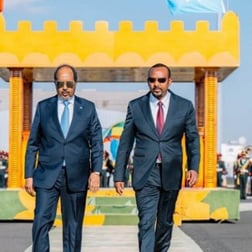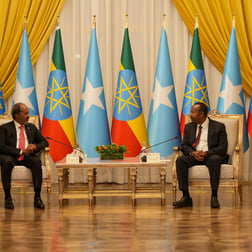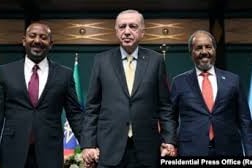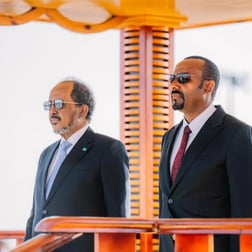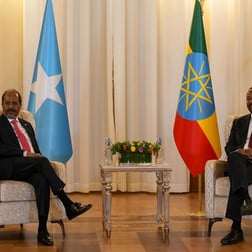The Somalia-Ethiopia Conflict: Post-Colonial Era Tensions
Ethiopia’s pursuit of ocean access through a controversial deal with Somaliland has sparked a diplomatic crisis with Somalia, which sees it as a violation of its sovereignty. The dispute has heightened regional tensions, drawing international attention to stability in the Horn of Africa.
1/28/20255 min read


The Somalia-Ethiopia Conflict: Post-Colonial Era Tensions
The conflict between Somalia and Ethiopia, rooted in territorial disputes and ethnic identity, has been one of the most enduring rivalries in East Africa. Following the end of colonial rule in the mid-20th century, tensions between the two nations escalated, largely centered on the Ogaden region, a Somali-populated area within Ethiopia. This area became a focal point of Somali nationalism and aspirations for a "Greater Somalia," which sought to unite all Somali-inhabited territories across the Horn of Africa, including parts of Ethiopia, Kenya, and Djibouti.
Early Tensions After Independence
When Somalia gained independence in 1960, its leadership prioritized uniting Somali-speaking people under one nation. Ethiopia, however, firmly opposed ceding the Ogaden region, which had been incorporated into its territory during the colonial era. The Ethiopian government viewed Somalia’s territorial ambitions as a direct threat to its sovereignty and territorial integrity.
The first significant clash occurred in the early 1960s, when Somali guerrilla fighters, supported by the Somali government, launched cross-border raids into the Ogaden. These skirmishes marked the beginning of decades of hostility between the two countries. Ethiopia, with its larger military and external support, successfully repelled these early incursions, but the conflict simmered beneath the surface.
The Ogaden War (1977-1978)
The most notable chapter of the Somalia-Ethiopia conflict was the Ogaden War. In 1977, under the leadership of President Siad Barre, Somalia launched a full-scale military invasion of the Ogaden region. Backed by Somali-trained militias and armed with Soviet weaponry, Somali forces initially made significant advances, capturing large portions of the territory.
However, the tide of the war turned when Ethiopia received massive military and logistical support from the Soviet Union and Cuba. Thousands of Cuban troops and Soviet advisors bolstered Ethiopian forces, pushing Somali troops out of the Ogaden by early 1978. The defeat dealt a significant blow to Somalia, weakening its military and destabilizing Siad Barre's regime.
Post-War Relations and Continued Tensions
After the Ogaden War, relations between Somalia and Ethiopia remained hostile. Both countries supported rebel groups seeking to destabilize each other's governments. Ethiopia provided refuge and aid to Somali opposition factions, while Somalia supported Ethiopian insurgents, particularly in the Oromia and Eritrea regions.
The collapse of Siad Barre’s government in 1991 and Somalia's subsequent civil war shifted the dynamics of the conflict. Ethiopia intervened in Somalia multiple times, citing concerns about cross-border terrorism and instability spilling into its territory. Notably, Ethiopian forces entered Somalia in 2006 to oust the Islamic Courts Union (ICU), a political and military movement that Ethiopia viewed as a threat to its security.
Modern Dynamics
In recent years, the relationship between Somalia and Ethiopia has evolved. While tensions over the Ogaden and national security remain, both nations have sought to improve diplomatic ties and collaborate on regional stability. Ethiopia, under its federal system, granted limited autonomy to the Somali Region (formerly Ogaden), although discontent among Somali Ethiopians persists.
Regional organizations like the African Union and IGAD (Intergovernmental Authority on Development) have facilitated dialogue and cooperation, particularly in combating terrorism and addressing shared economic challenges. However, historical grievances and competing interests continue to strain relations.
The Current Somalia-Ethiopia Conflict Over Ocean Access
The ongoing tensions between Somalia and Ethiopia have been reignited by Ethiopia’s pursuit of access to the Red Sea and Indian Ocean, a move that Somalia views as a violation of its sovereignty. This dispute escalated in early 2024 when Ethiopia signed a controversial agreement with the breakaway region of Somaliland, seeking a strategic foothold in the Gulf of Aden. The deal has sparked strong reactions from Somalia, regional actors, and international stakeholders, threatening to destabilize relations between the two neighboring nations.
Background of the Dispute
Ethiopia, a landlocked country since Eritrea’s independence in 1993, has long sought direct access to the sea to boost trade and economic growth. Historically, Ethiopia relied on Djibouti’s ports for most of its maritime trade, with some use of Sudanese and Kenyan ports. However, with increasing trade volumes and economic ambitions, Ethiopia has explored alternative routes, including access to Somalia’s coastline.
In January 2024, Ethiopia signed a memorandum of understanding (MoU) with Somaliland, a self-declared but internationally unrecognized region of Somalia. The agreement reportedly grants Ethiopia a 50-year lease for a military and commercial port in exchange for possible recognition of Somaliland’s independence. This move has sparked outrage in Somalia, which considers Somaliland an integral part of its territory.
Somalia’s Reaction and Diplomatic Fallout
The Somali government strongly condemned Ethiopia’s agreement with Somaliland, calling it an attack on Somalia’s sovereignty. President Hassan Sheikh Mohamud and other Somali leaders have rejected any foreign agreements that undermine Somalia’s territorial integrity, warning that Ethiopia’s actions could lead to regional instability.
Somalia has taken diplomatic measures to counter Ethiopia’s move, including:
Calling on the African Union (AU) and the United Nations (UN) to intervene and uphold Somalia’s territorial integrity.
Engaging with regional allies, such as Turkey, Qatar, and the Arab League, to rally support against Ethiopia’s actions.
Reaffirming sovereignty over Somaliland, with President Mohamud declaring that no foreign power has the right to negotiate with Somali territories.
Ethiopia’s Justification and Strategic Interests
Ethiopia argues that its need for direct sea access is crucial for national security and economic growth. Ethiopian Prime Minister Abiy Ahmed has repeatedly emphasized Ethiopia’s right to maritime access, stating that a country of Ethiopia’s size and economic ambition cannot remain dependent on Djibouti’s ports indefinitely.
Ethiopia has justified its deal with Somaliland on several grounds:
Economic Expansion: Ethiopia seeks a reliable trade route to support its growing economy and reduce reliance on Djibouti’s expensive port fees.
Security Concerns: Ethiopia believes a direct presence on the coast will enhance its ability to secure trade routes and counter piracy and extremist threats.
Geopolitical Influence: By securing a port, Ethiopia aims to strengthen its influence in the Horn of Africa and compete with other regional powers.
Regional and International Implications
The Somalia-Ethiopia conflict over ocean access has broader regional and global implications.
Horn of Africa Stability: This dispute risks destabilizing an already fragile region, where conflicts in Sudan, South Sudan, and the Red Sea have heightened tensions.
Djibouti’s Position: Ethiopia’s move threatens Djibouti’s economic interests, as the small nation relies heavily on Ethiopian trade passing through its ports.
Arab League and Gulf States: Countries like Egypt, Saudi Arabia, and the UAE are closely watching the situation, as Red Sea and Gulf of Aden access is strategically vital for trade and military influence.
Western Powers and China: Global powers with interests in the Horn of Africa, including the U.S., European Union, and China, are concerned about the potential escalation of the conflict.
Possible Resolutions and the Way Forward
To prevent further deterioration of relations, both Somalia and Ethiopia must engage in diplomatic dialogue. Possible solutions include:
Mediation by the African Union (AU) or IGAD: A neutral regional body could help broker a peaceful resolution that respects Somalia’s sovereignty while addressing Ethiopia’s economic concerns.
Economic Partnerships: Ethiopia and Somalia could explore joint ventures in port development, allowing Ethiopia access while keeping Somali sovereignty intact.
International Arbitration: The UN or the International Court of Justice (ICJ) could be involved to settle the dispute through legal means.

